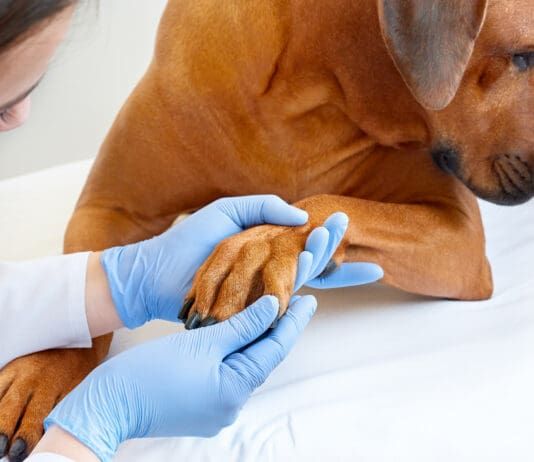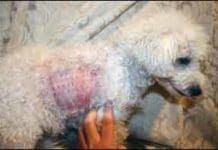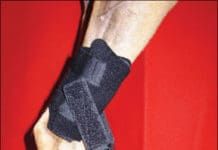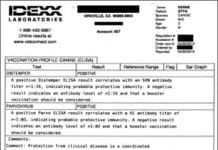When It Comes to Allergy Tests, Some Dogs Flunk
There are a few different types of tests available that purport to identify the allergens to which a dog is hypersensitive; some of them are helpful, and some are a waste of time and money. Since all of them are commonly referred to as allergy tests
Food Elimination Trial: A Valuable Tool (When Done Correctly)
A valid food elimination trial for the purpose of confirming food hypersensitivity consists of three phases: elimination, challenge, and provocation. In the first (elimination) phase, the dog is fed a diet consisting of a single protein source and a single carbohydrate source. Both of these ingredients should be completely “novel” to the dog – foods he’s never eaten before. (Thirty years ago, lamb and rice was the go-to food elimination diet, because those ingredients were not yet widely available in commercial pet foods. Because the diet was novel, few dogs had developed allergies to those ingredients, and “lamb and rice” gained an unearned reputation as a “hypoallergenic” diet.
Corticosteroids: Lifesaver or Killer?
There are almost as many opinions among veterinarians concerning the use of corticosteroids as there are veterinarians. Some feel that these drugs – prednisone, prednisolone, methylprednisolone, and dexamethasone foremost among them – are invaluable to every dog who itches; some feel that corticosteroids ought to be used only as a last resort, and only for short periods and in small amounts. Still others regard them as verboten. Why are these drugs so controversial?
Are Heartworms Developing Resistance to Preventatives?
In August 2010, representatives of the American Heartworm Society (AHS), the Companion Animal Parasite Council (CAPC), and experts in the field of nematode resistance met in Atlanta. Their goal was to discuss the possibility of heartworms becoming resistant to macrocyclic lactones
New Treatment for Pituitary-Dependent Cushing’s Disease
A surgical procedure used on humans to remove brain tumors that cause Cushing’s disease is now becoming available to dogs, thanks to collaboration between a human neurosurgeon, a veterinary endocrinologist, and a veterinary surgeon in the Los Angeles area.Cushing’s disease (hyperadrenocorticism, or HAC) is an adrenal disorder common in middle-aged and older dogs, affecting an estimated 100,000 dogs per year in the U.S. It occurs when the body produces too much cortisol, causing increased appetite and thirst, skin problems, and muscle weakness. Cushing’s can also predispose dogs to other conditions such as diabetes, pancreatitis, and infections.
Orthopedic Equipment for Dogs Designed for Increased Mobility and Extra Support
Do you have a dog recovering from orthopedic or neurologic surgery, one who has mobility issues, or a senior dog who has arthritis? If so, at some point, you have probably wished you could do something anything! to help make your dog's life (and your own) a little easier. I asked two veterinarians who specialize in canine rehabilitation to share some of their top picks for canine assistive/rehabilitative equipment. Laurie McCauley, DVM, CCRT, is founder and medical director of TOPS Veterinary Rehabilitation in Grayslake, Illinois, and is considered one of the pioneers in the field of veterinary rehabilitation. Evelyn Orenbuch, DVM, CAVCA, CCRT, recently opened Georgia Veterinary Rehabilitation, Fitness and Pain Management in Marietta, Georgia, and has focused on veterinary rehab medicine since 2003.
Blood Transfusions for Dogs
Denise Mankin, DVM, was on duty late one night in a Des Moines, Iowa, emergency veterinary clinic when Yeller, a Labrador Retriever, was rushed in sporting a fresh wound to his back. Yeller had been shot after escaping from his rural home. After stabilizing Yeller with IV fluids, antibiotics, and pain medications, Mankin opened up the dog's abdomen to find blood filling his abdominal cavity. A bullet had perforated Yeller's small intestine in five different locations, and two of the sites were hemorrhaging profusely. Within moments, his blood pressure plummeted. As Mankin worked desperately to tie off the blood supply to his damaged bowel, Yeller went into cardiac arrest. Cardiac drugs restored Yeller's heart beat, and donor blood, having been warmed for transfusion, was pumped into him.
An Update on “Low Uric Acid” Dalmatians
A few months ago, I wrote about the British Kennel Club’s registration of two special Dalmatians over the objections of the breed clubs there (Whole Dog Journal June 2010). These two dogs were the result of a breeding project begun in 1973, in which a single outcross to a Pointer was made in order to reintroduce the normal gene for uric acid back into the Dalmatian bloodline.
A Safer Way to Spay Your Puppy
Making a fresh look at the things we take for granted can be wonderfully enlightening. Sometimes, the little light bulb overhead begins to sizzle and sparkle, illuminating a new and better way of doing things. Consider this example: When some savvy veterinarians took a fresh look at performing spays, a surgery we've been doing the exact same way for decades, they came up with a revised technique that accomplishes all of the objectives of the spay surgery with fewer complications. How cool is that?
Bone Marrow Transplants Offer a Promising Treatment for Canine Lymphoma
Exciting news regarding bone marrow transplants for dogs with lymphoma has recently emerged. North Carolina State University’s College of Veterinary Medicine in Raleigh is the first university in the world to open a canine clinical bone marrow transplant (BMT) unit. Dr. Steven Suter, assistant professor of veterinary oncology at NCSU, is about to perform his 30th transplant, all done over the past two years. Lymphoma, also called lymphosarcoma, is one of the most common cancers to occur in dogs. While it used to be considered a disease of middle-aged and older dogs, those demographics have changed in the past 5 to 10 years, with more and more young dogs being diagnosed. Golden Retrievers have a particularly high risk for this type of cancer.
Beware of Over-Vaccinating Your Dog
In Whole Dog Journal's opinion, annual vaccination for most canine diseases is unnecessary and potentially harmful. Dog owners should avoid employing those old-fashioned veterinarians who recommend annual vaccines. Owners should also avoid those veterinary service providers who provide inexpensive vaccines and other routine care without the benefit of a relationship with you and your dog beyond a brief transaction in a parking lot or pet supply store.


















